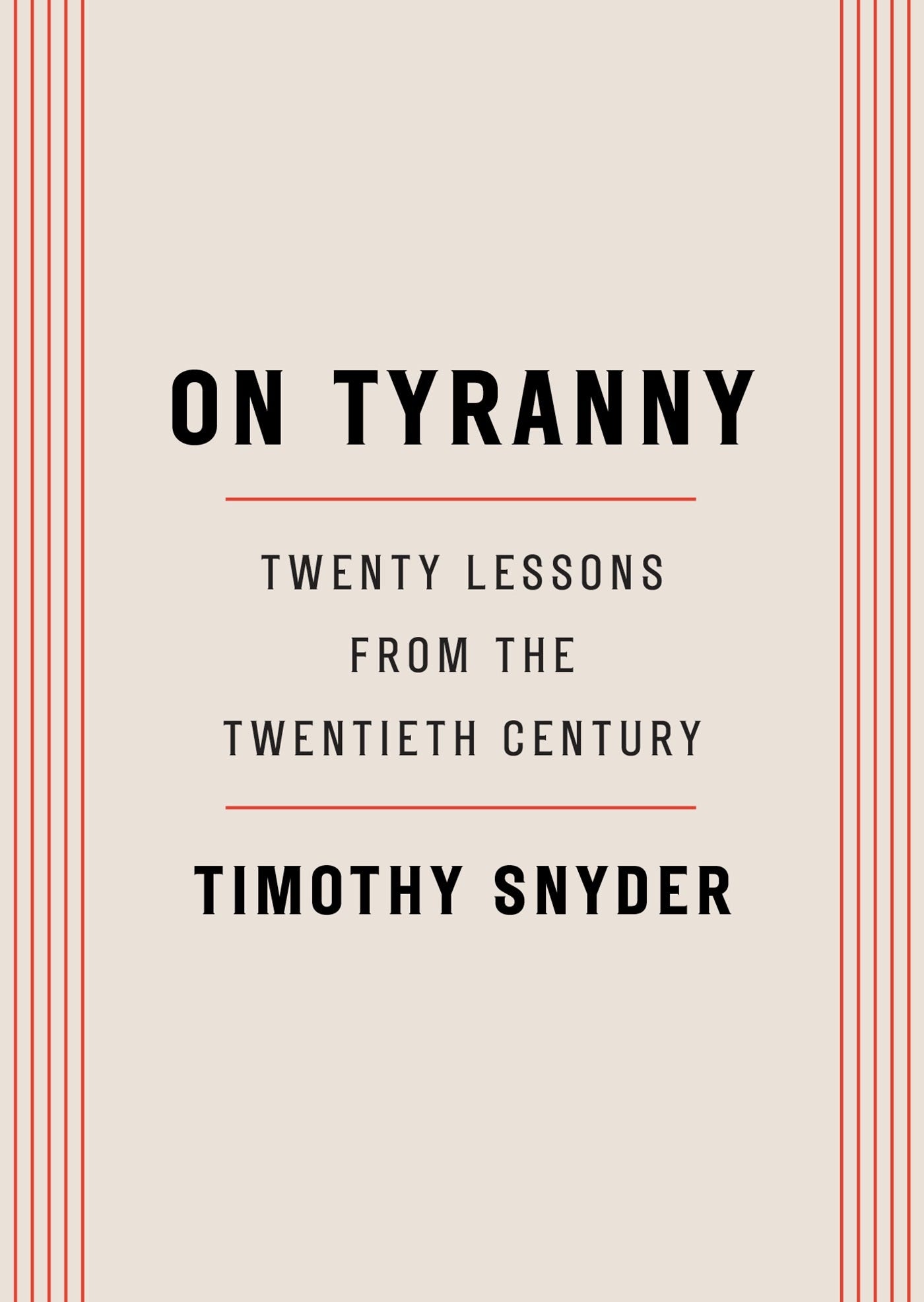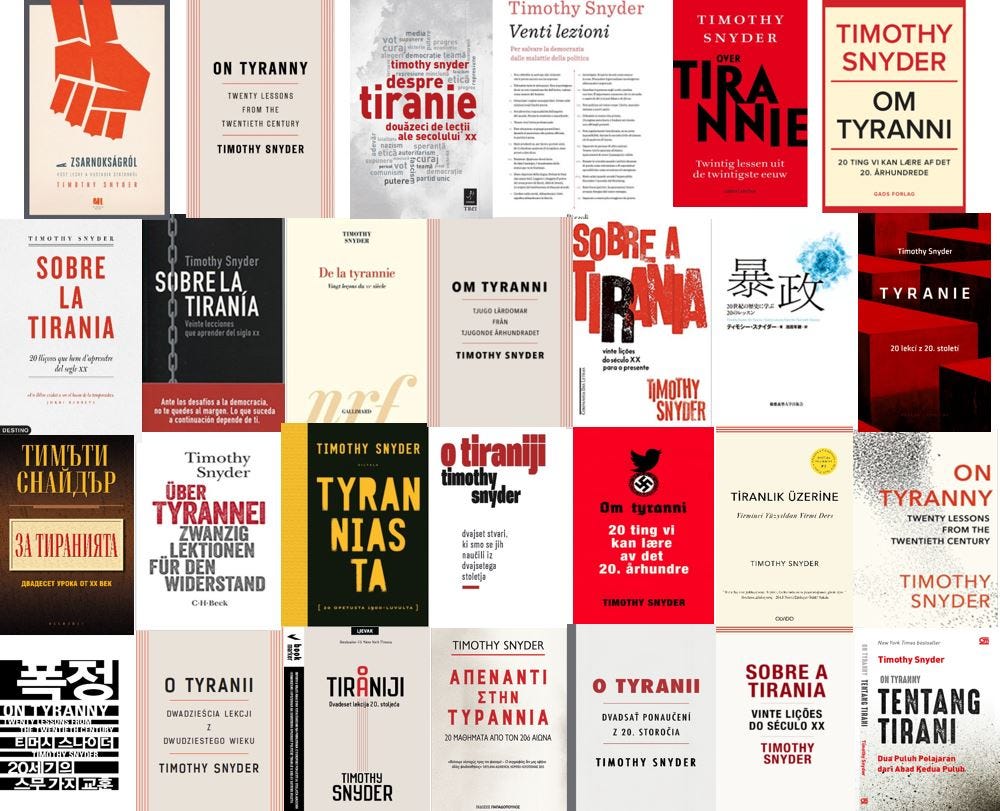These are twenty lessons from the twentieth century I published seven years ago, first as a kind of online declaration, and then, with historical examples, in a pamphlet called On Tyranny.
They were written in advance of the first Trump presidency, and have been used since in the U.S. and around the world.
For those who want democracy and the rule of law in the United States after 2024, I would only add: now is the time to organize, to prepare to win locally and nationally, and to talk not only about what is to be lost but what can be gained.
I wrote On Tyranny in a defensive mode; but freedom is something not only to be defended but to be defined and to be celebrated. As for me, I believe that if we can get through the next year, things could get better. Much better.
For now, three years after Trump’s attempt to end democracy and the rule of law in the United States, a reminder of the lessons. I recall them now in then hope that I won’t have to do so again a year from now.
1. Do not obey in advance. Most of the power of authoritarianism is freely given. In times like these, individuals think ahead about what a more repressive government will want, and then offer themselves without being asked. A citizen who adapts in this way is teaching power what it can do.
2. Defend institutions. It is institutions that help us to preserve decency. They need our help as well. Do not speak of "our institutions" unless you make them yours by acting on their behalf. Institutions do not protect themselves. They fall one after the other unless each is defended from the beginning. So choose an institution you care about -- a court, a newspaper, a law, a labor union -- and take its side.
3. Beware the one-party state. The parties that remade states and suppressed rivals were not omnipotent from the start. They exploited a historic moment to make political life impossible for their opponents. So support the multiple-party system and defend the rules of democratic elections. Vote in local and state elections while you can. Consider running for office.
4. Take responsibility for the face of the world. The symbols of today enable the reality of tomorrow. Notice the swastikas and the other signs of hate. Do not look away, and do not get used to them. Remove them yourself and set an example for others to do so.
5. Remember professional ethics. When political leaders set a negative example, professional commitments to just practice become more important. It is hard to subvert a rule-of-law state without lawyers, or to hold show trials without judges. Authoritarians need obedient civil servants, and concentration camp directors seek businessmen interested in cheap labor.
6. Be wary of paramilitaries. When the men with guns who have always claimed to be against the system start wearing uniforms and marching with torches and pictures of a leader, the end is nigh. When the pro-leader paramilitary and the official police and military intermingle, the end has come.
7. Be reflective if you must be armed. If you carry a weapon in public service, may God bless you and keep you. But know that evils of the past involved policemen and soldiers finding themselves, one day, doing irregular things. Be ready to say no.
8. Stand out. Someone has to. It is easy to follow along. It can feel strange to do or say something different. But without that unease, there is no freedom. Remember Rosa Parks. The moment you set an example, the spell of the status quo is broken, and others will follow.
9. Be kind to our language. Avoid pronouncing the phrases everyone else does. Think up your own way of speaking, even if only to convey that thing you think everyone is saying. Make an effort to separate yourself from the internet. Read books.
10. Believe in truth. To abandon facts is to abandon freedom. If nothing is true, then no one can criticize power, because there is no basis upon which to do so. If nothing is true, then all is spectacle. The biggest wallet pays for the most blinding lights.
11. Investigate. Figure things out for yourself. Spend more time with long articles. Subsidize investigative journalism by subscribing to print media. Realize that some of what is on the internet is there to harm you. Learn about sites that investigate propaganda campaigns (some of which come from abroad). Take responsibility for what you communicate with others.
12. Make eye contact and small talk. This is not just polite. It is part of being a citizen and a responsible member of society. It is also a way to stay in touch with your surroundings, break down social barriers, and understand whom you should and should not trust. If we enter a culture of denunciation, you will want to know the psychological landscape of your daily life.
13. Practice corporeal politics. Power wants your body softening in your chair and your emotions dissipating on the screen. Get outside. Put your body in unfamiliar places with unfamiliar people. Make new friends and march with them.
14. Establish a private life. Nastier rulers will use what they know about you to push you around. Scrub your computer of malware on a regular basis. Remember that email is skywriting. Consider using alternative forms of the internet, or simply using it less. Have personal exchanges in person. For the same reason, resolve any legal trouble. Tyrants seek the hook on which to hang you. Try not to have hooks.
15. Contribute to good causes. Be active in organizations, political or not, that express your own view of life. Pick a charity or two and set up autopay. Then you will have made a free choice that supports civil society and helps others to do good.
16. Learn from peers in other countries. Keep up your friendships abroad, or make new friends in other countries. The present difficulties in the United States are an element of a larger trend. And no country is going to find a solution by itself. Make sure you and your family have passports.
17. Listen for dangerous words. Be alert to use of the words "extremism" and "terrorism." Be alive to the fatal notions of "emergency" and "exception." Be angry about the treacherous use of patriotic vocabulary.
18. Be calm when the unthinkable arrives. Modern tyranny is terror management. When the terrorist attack comes, remember that authoritarians exploit such events in order to consolidate power. The sudden disaster that requires the end of checks and balances, the dissolution of opposition parties, the suspension of freedom of expression, the right to a fair trial, and so on, is the oldest trick in the Hitlerian book. Do not fall for it.
19. Be a patriot. Set a good example of what America means for the generations to come. They will need it.
20. Be as courageous as you can. If none of us is prepared to die for freedom, then all of us will die under tyranny.
These lessons are the openings of the twenty chapters of On Tyranny, which has been updated to account for the Big Lie, the coup attempt, the war in Ukraine, and the risks we face in 2024. On Tyranny has also been published in a beautiful graphic edition, illustrated by Nora Krug.







I would add a 21st resolution: Start teaching civic classes again in our schools. Too many American citizens have no idea what we are on the verge of losing. Americans need to be taught again what the idea of the United States actually means.
I am refreshing this post because I have an update on the second Safe Skies donation project, which I received today from United24.
Over $1.5 million for the Safe Skies system — done 🔥
Just imagine, our ambassador, along with four professors from the world’s leading universities, raised funds for 2500 sensors that will help protect Sumy, Odesa, Mykolaiv and Kherson oblasts from drones and missiles.
But Timothy wouldn’t be himself if he didn’t decide to keep going! He is raising another $950 000 which will be enough to protect Kharkiv, Kirovohrad, Poltava and Cherkasy oblasts.
Just $300,000 stands between our ambassador and the goal of $1,900,000. This is the cost of 5,000 sensors that will help Ukrainian Air Forces protect the Ukrainian sky even more effectively in eight regions.
Support Timothy Snyder! Support Ukraine!
Here is the link: https://u24.gov.ua/safeskies
You do not have to donate a pre-determined amount, the line above those figures allows you to donate as little or as much as you wish. I'll do my part.
---
I remember sharing those lessons one by one on social media as mantras lest we should forget. The 'lessons' are still guiding my practice as a teacher educator and ordinary citizen. The essence of the principles provided by this pocket-book size volume hits deeper and deeper every day. Also what Masha Gessen said at the time and has been saying ever since.
In mid-March 2022, I warned my Ukrainian teacher colleagues to check the validity of their passports and send copies of important documents up to the Cloud system. Some asked me not to cause panic. I said that making sure you have a valid passport is the opposite of panicking.
I don't think we should engage with the gentleman who has commented below. His posts reflect his unshakeable stance.
This morning, after yesterday's chaos, prison riots and kidnappings, and the announcement of a state of emergency for sixty days in Ecuador (where I live), I received this message from a Ukrainian member of the educational fundraising group in which we work together:
"That’s bad news. Really sorry! At the time you Elli gave me lots of good suggestions on how to survive. Some of them saved my life. It’s time you follow them too. Be strong! Keep safe as much as possible in the situation."
So, yes, "Be calm when the unthinkable arrives." ( Lesson 18)